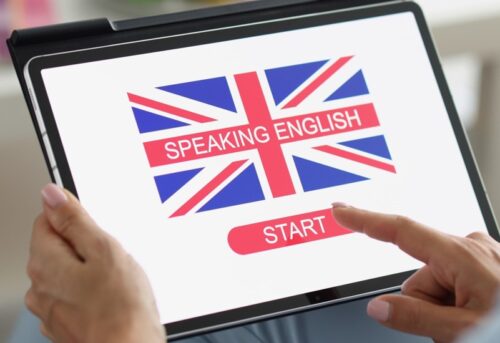-
 OBJETIVOS En este nivel están en el centro de los objetivos de aprendizaje tanto el desarrollo de funciones sociales del lenguaje, como la interacción lingüística en países extranjeros germanohablantes. El alumno será capaz de entender expresiones de uso frecuente relacionadas con ámbitos de significado inmediato. En este bloque, el alumno aprende a describirse a si mimo y a otras personas de forma sencilla. Llevara y aprenderá conversaciones sencillas sobre el aspecto y la posición de personas, y expresará la probabilidad, la obligación y la frecuencia. Además podrá denominar correctamente entre otras cosas a las partes del cuerpo humano, la ropa y a los puntos de orientación importantes en ciudades y lugares.
OBJETIVOS En este nivel están en el centro de los objetivos de aprendizaje tanto el desarrollo de funciones sociales del lenguaje, como la interacción lingüística en países extranjeros germanohablantes. El alumno será capaz de entender expresiones de uso frecuente relacionadas con ámbitos de significado inmediato. En este bloque, el alumno aprende a describirse a si mimo y a otras personas de forma sencilla. Llevara y aprenderá conversaciones sencillas sobre el aspecto y la posición de personas, y expresará la probabilidad, la obligación y la frecuencia. Además podrá denominar correctamente entre otras cosas a las partes del cuerpo humano, la ropa y a los puntos de orientación importantes en ciudades y lugares. -
 OBJETIVOS El objetivo principal de este nivel es enseñarle al alumno una serie de capacidades, para que tras terminar el curso pueda hacerse entender de forma sencilla. El alumno será capaz de entender y utilizar expresiones familiares y diarias que pretenden satisfacer necesidades concretas. A lo largo de la progresión, el alumno aprenderá a describir su entorno inmediato de manera elemental, a interactuar en situaciones comunicativas básicas, así como identificar y nombrar correctamente los objetos de la vida diaria con construcciones atributivas sencillas.
OBJETIVOS El objetivo principal de este nivel es enseñarle al alumno una serie de capacidades, para que tras terminar el curso pueda hacerse entender de forma sencilla. El alumno será capaz de entender y utilizar expresiones familiares y diarias que pretenden satisfacer necesidades concretas. A lo largo de la progresión, el alumno aprenderá a describir su entorno inmediato de manera elemental, a interactuar en situaciones comunicativas básicas, así como identificar y nombrar correctamente los objetos de la vida diaria con construcciones atributivas sencillas. -
 Objetivos Con este contenido de curso profesional el alumnado aprenderá el concepto de logística a nivel internacional abarcando aspectos como las infraestructuras y plataformas logísticas, la gestión de la cadena de suministros, la optimización y componentes de los costes logísticos, así como la logística inversa internacional y las alternativas de distribución. Dirigido a profesionales de empresas de actividad logística que quieran ampliar sus conocimientos en el concepto de logística internacional, poniendo especial énfasis en directivos, mandos intermedios y trabajadores del departamento de logística.
Objetivos Con este contenido de curso profesional el alumnado aprenderá el concepto de logística a nivel internacional abarcando aspectos como las infraestructuras y plataformas logísticas, la gestión de la cadena de suministros, la optimización y componentes de los costes logísticos, así como la logística inversa internacional y las alternativas de distribución. Dirigido a profesionales de empresas de actividad logística que quieran ampliar sus conocimientos en el concepto de logística internacional, poniendo especial énfasis en directivos, mandos intermedios y trabajadores del departamento de logística. -
 Objetivos Objetivos Con este contenido de curso profesional el alumno aprenderá el Análisis de Puestos de Trabajo (ATP) como elemento fundamental en la gestión de RRHH, abarcando las técnicas de ATP, características, ventajas e inconvenientes, las fases de implantación, el documento resultado de un ATP (Descripción del Puesto de Trabajo), así como las novedades en recursos tecnológico en materia de ATP. Dirigido a profesionales del área de gestión y control de administración, personal administrativo, empresarios individuales, etc., poniendo especial énfasis en aquellos trabajadores que se responsabilicen de la gestión de los recursos humanos de una empresa.
Objetivos Objetivos Con este contenido de curso profesional el alumno aprenderá el Análisis de Puestos de Trabajo (ATP) como elemento fundamental en la gestión de RRHH, abarcando las técnicas de ATP, características, ventajas e inconvenientes, las fases de implantación, el documento resultado de un ATP (Descripción del Puesto de Trabajo), así como las novedades en recursos tecnológico en materia de ATP. Dirigido a profesionales del área de gestión y control de administración, personal administrativo, empresarios individuales, etc., poniendo especial énfasis en aquellos trabajadores que se responsabilicen de la gestión de los recursos humanos de una empresa. -
 OBJETIVOS In this block the learner will consolidate the material from the previous Blocks and begin the transition from B1 to a B2. The course content remains functional and focused entirely on improving learner independence in all areas, especially in real-life situations such as work and leisure, house and home, films and habitual actions etc. In this block the learner will continue to notice an increased confidence when faced with basic functions and will be able to read an English or American newspaper with little difficulty, follow conversations in English with native speakers and participate in more complex exchanges. In terms of grammatical structures there will be continued revision and extension of the structures covered with emphasis on parts of the language such as phrasal verbs, idiomatic expressions and the differences between British and American vocabulary. As with the other blocks on the course, there is frequent pronunciation practice and the learner has exposure to long and short sounds, correct regular past tense endings, minimal pairs, elision as well as general vocabulary and sentence level practice. The use of a variety of exercises encompasses different learner styles as well as guaranteeing thorough coverage of the topics covered. The block is comprised of a series of interactive exercises such as word-picture association, listening comprehension with short, realistic dialogues and student-led listening practice with the vocabulary items.
OBJETIVOS In this block the learner will consolidate the material from the previous Blocks and begin the transition from B1 to a B2. The course content remains functional and focused entirely on improving learner independence in all areas, especially in real-life situations such as work and leisure, house and home, films and habitual actions etc. In this block the learner will continue to notice an increased confidence when faced with basic functions and will be able to read an English or American newspaper with little difficulty, follow conversations in English with native speakers and participate in more complex exchanges. In terms of grammatical structures there will be continued revision and extension of the structures covered with emphasis on parts of the language such as phrasal verbs, idiomatic expressions and the differences between British and American vocabulary. As with the other blocks on the course, there is frequent pronunciation practice and the learner has exposure to long and short sounds, correct regular past tense endings, minimal pairs, elision as well as general vocabulary and sentence level practice. The use of a variety of exercises encompasses different learner styles as well as guaranteeing thorough coverage of the topics covered. The block is comprised of a series of interactive exercises such as word-picture association, listening comprehension with short, realistic dialogues and student-led listening practice with the vocabulary items. -
 OBJETIVOS This short course looks at the process of f inding work. The f irst lessons focus on the initial part of the process from the point of view of a Human Resources department, introducing some of the key vocabulary used to talk about working l i fe and common collocations used to describe the different phases that people pass through during their career. The course then moves on to look at adjectives used to describe personal qualities and giving reasons for our opinions and choices, a useful skill for interview situations. The second unit looks at more specific vocabulary and grammar to help in a job interview. There is revision on describing physical spaces as well as describing roles within a company. As courtesy plays an important role in job interviews, there is a lesson covering the most useful expressions to deal with social situations politely. This unit also includes an introduction to virtual job interviews and how to prepare for them, reflecting the shift towards using online tools to carry out the initial phase of the selection process. The f inal unit looks at simulations job interviews and gives the learner some concrete examples of interview language through l istening and speaking exercises with role- play situations to put all the previously covered topics into practical use. ESTE CURSO ONLINE ES BONIFICABLE: ¡ CONSÚLTANOS! FINDING A JOB Human resources The language of the Human Resource department: redundancy package, golden handshake, to let someone go/lay people off, headhunting, disputes, settlements, hiring and firing, payroll, performance appraisals, liaise with. Describing functions and procedures within a HR department. The right person for the job Evaluating personal qualities and choosing the best candidate from given information. Comparing and contrasting candidates and giving opinions and reasons for our choices. Are you a lone wolf? Discussing working styles and personality traits. Giving reasons and explanations for opinions. Adjectives to describe character: moody, open, a loner, selfish, sensitive, practical, gossip, practical joker, lone wolf. PREPARING FOR THE JOB INTERVIEW Describing your position and workplace. There is / There are Grammar - There is / There are Function - Describing a role / position Grammar - Courtesy, making requests, interrupting, confirming Grammar - Courtesy, making requests, interrupting, confirming Virtual interviews This lesson covers the area of virtual interviews. As well as looking at the typical language of job interviews, it also covers the newer topic of doing a job interview at a distance, either in real time or as recorded responses to set questions. There is a reading comprehension exercise about this style of interview as well as a gapped text to practice a typical exam task. The listening task focuses on typical questions and answers that may be encountered in an interview situation as well as the opportunity to listen to, and repeat some useful expressions. JOB INTERVIEWS Typical situation - Job interview In this audio, we will be listening to Philipa, personnel head Swan Selection company and Lee, who is being interviewed. Job interview Talk about ways to find a job and the interview process. Common vocabulary: to apply for a job, fill in a form, work history, impressive, gaps in employment, to take a year out/gap year, to do voluntary work/work experience, qualifications. Role-play a short job interview JOB INTERVIEWS - REVISION Finding a job - vocabulary A comprehensive review of some of the key vocabulary for the topic of finding a job. Exercises include crossword, word search and matching exercises. Typical expressions In this review of typical expressions to use in social situations students will practice listening and writing with a dictation exercise as well as an exercise with gapped sentences to choose the correct expression to use. Job interviews This lesson includes typical expressions and questions used in job interviews. There is a gapped listening exercise, a question and answers matching exercise as well as gapped sentences. There is also an exercise to review the similarities and differences between face to face and virtual interviews.
OBJETIVOS This short course looks at the process of f inding work. The f irst lessons focus on the initial part of the process from the point of view of a Human Resources department, introducing some of the key vocabulary used to talk about working l i fe and common collocations used to describe the different phases that people pass through during their career. The course then moves on to look at adjectives used to describe personal qualities and giving reasons for our opinions and choices, a useful skill for interview situations. The second unit looks at more specific vocabulary and grammar to help in a job interview. There is revision on describing physical spaces as well as describing roles within a company. As courtesy plays an important role in job interviews, there is a lesson covering the most useful expressions to deal with social situations politely. This unit also includes an introduction to virtual job interviews and how to prepare for them, reflecting the shift towards using online tools to carry out the initial phase of the selection process. The f inal unit looks at simulations job interviews and gives the learner some concrete examples of interview language through l istening and speaking exercises with role- play situations to put all the previously covered topics into practical use. ESTE CURSO ONLINE ES BONIFICABLE: ¡ CONSÚLTANOS! FINDING A JOB Human resources The language of the Human Resource department: redundancy package, golden handshake, to let someone go/lay people off, headhunting, disputes, settlements, hiring and firing, payroll, performance appraisals, liaise with. Describing functions and procedures within a HR department. The right person for the job Evaluating personal qualities and choosing the best candidate from given information. Comparing and contrasting candidates and giving opinions and reasons for our choices. Are you a lone wolf? Discussing working styles and personality traits. Giving reasons and explanations for opinions. Adjectives to describe character: moody, open, a loner, selfish, sensitive, practical, gossip, practical joker, lone wolf. PREPARING FOR THE JOB INTERVIEW Describing your position and workplace. There is / There are Grammar - There is / There are Function - Describing a role / position Grammar - Courtesy, making requests, interrupting, confirming Grammar - Courtesy, making requests, interrupting, confirming Virtual interviews This lesson covers the area of virtual interviews. As well as looking at the typical language of job interviews, it also covers the newer topic of doing a job interview at a distance, either in real time or as recorded responses to set questions. There is a reading comprehension exercise about this style of interview as well as a gapped text to practice a typical exam task. The listening task focuses on typical questions and answers that may be encountered in an interview situation as well as the opportunity to listen to, and repeat some useful expressions. JOB INTERVIEWS Typical situation - Job interview In this audio, we will be listening to Philipa, personnel head Swan Selection company and Lee, who is being interviewed. Job interview Talk about ways to find a job and the interview process. Common vocabulary: to apply for a job, fill in a form, work history, impressive, gaps in employment, to take a year out/gap year, to do voluntary work/work experience, qualifications. Role-play a short job interview JOB INTERVIEWS - REVISION Finding a job - vocabulary A comprehensive review of some of the key vocabulary for the topic of finding a job. Exercises include crossword, word search and matching exercises. Typical expressions In this review of typical expressions to use in social situations students will practice listening and writing with a dictation exercise as well as an exercise with gapped sentences to choose the correct expression to use. Job interviews This lesson includes typical expressions and questions used in job interviews. There is a gapped listening exercise, a question and answers matching exercise as well as gapped sentences. There is also an exercise to review the similarities and differences between face to face and virtual interviews. -
 OBJETIVOS A high level of English which let you to manage yourself without any problem with any people of English spoken language and in situations which require a very formal an totally fluent English. It is advised for those one who have a daily contact with the English language, both at work or travelling, or for those ones who simply want to have the personal satisfaction to speak a language perfectly.
OBJETIVOS A high level of English which let you to manage yourself without any problem with any people of English spoken language and in situations which require a very formal an totally fluent English. It is advised for those one who have a daily contact with the English language, both at work or travelling, or for those ones who simply want to have the personal satisfaction to speak a language perfectly. -
 OBJETIVOS This short course looks at the process of f inding work. The f irst lessons focus on the initial part of the process from the point of view of a Human Resources department, introducing some of the key vocabulary used to talk about working l i fe and common collocations used to describe the different phases that people pass through during their career. The course then moves on to look at adjectives used to describe personal qualities and giving reasons for our opinions and choices, a useful skill for interview situations. The second unit looks at more specific vocabulary and grammar to help in a job interview. There is revision on describing physical spaces as well as describing roles within a company. As courtesy plays an important role in job interviews, there is a lesson covering the most useful expressions to deal with social situations politely. This unit also includes an introduction to virtual job interviews and how to prepare for them, reflecting the shift towards using online tools to carry out the initial phase of the selection process. The f inal unit looks at simulations job interviews and gives the learner some concrete examples of interview language through l istening and speaking exercises with role- play situations to put all the previously covered topics into practical use. ESTE CURSO ONLINE ES BONIFICABLE: ¡ CONSÚLTANOS! FINDING A JOB Human resources The language of the Human Resource department: redundancy package, golden handshake, to let someone go/lay people off, headhunting, disputes, settlements, hiring and firing, payroll, performance appraisals, liaise with. Describing functions and procedures within a HR department. The right person for the job Evaluating personal qualities and choosing the best candidate from given information. Comparing and contrasting candidates and giving opinions and reasons for our choices. Are you a lone wolf? Discussing working styles and personality traits. Giving reasons and explanations for opinions. Adjectives to describe character: moody, open, a loner, selfish, sensitive, practical, gossip, practical joker, lone wolf. PREPARING FOR THE JOB INTERVIEW Describing your position and workplace. There is / There are Grammar - There is / There are Function - Describing a role / position Grammar - Courtesy, making requests, interrupting, confirming Grammar - Courtesy, making requests, interrupting, confirming Virtual interviews This lesson covers the area of virtual interviews. As well as looking at the typical language of job interviews, it also covers the newer topic of doing a job interview at a distance, either in real time or as recorded responses to set questions. There is a reading comprehension exercise about this style of interview as well as a gapped text to practice a typical exam task. The listening task focuses on typical questions and answers that may be encountered in an interview situation as well as the opportunity to listen to, and repeat some useful expressions. JOB INTERVIEWS Typical situation - Job interview In this audio, we will be listening to Philipa, personnel head Swan Selection company and Lee, who is being interviewed. Job interview Talk about ways to find a job and the interview process. Common vocabulary: to apply for a job, fill in a form, work history, impressive, gaps in employment, to take a year out/gap year, to do voluntary work/work experience, qualifications. Role-play a short job interview JOB INTERVIEWS - REVISION Finding a job - vocabulary A comprehensive review of some of the key vocabulary for the topic of finding a job. Exercises include crossword, word search and matching exercises. Typical expressions In this review of typical expressions to use in social situations students will practice listening and writing with a dictation exercise as well as an exercise with gapped sentences to choose the correct expression to use. Job interviews This lesson includes typical expressions and questions used in job interviews. There is a gapped listening exercise, a question and answers matching exercise as well as gapped sentences. There is also an exercise to review the similarities and differences between face to face and virtual interviews.
OBJETIVOS This short course looks at the process of f inding work. The f irst lessons focus on the initial part of the process from the point of view of a Human Resources department, introducing some of the key vocabulary used to talk about working l i fe and common collocations used to describe the different phases that people pass through during their career. The course then moves on to look at adjectives used to describe personal qualities and giving reasons for our opinions and choices, a useful skill for interview situations. The second unit looks at more specific vocabulary and grammar to help in a job interview. There is revision on describing physical spaces as well as describing roles within a company. As courtesy plays an important role in job interviews, there is a lesson covering the most useful expressions to deal with social situations politely. This unit also includes an introduction to virtual job interviews and how to prepare for them, reflecting the shift towards using online tools to carry out the initial phase of the selection process. The f inal unit looks at simulations job interviews and gives the learner some concrete examples of interview language through l istening and speaking exercises with role- play situations to put all the previously covered topics into practical use. ESTE CURSO ONLINE ES BONIFICABLE: ¡ CONSÚLTANOS! FINDING A JOB Human resources The language of the Human Resource department: redundancy package, golden handshake, to let someone go/lay people off, headhunting, disputes, settlements, hiring and firing, payroll, performance appraisals, liaise with. Describing functions and procedures within a HR department. The right person for the job Evaluating personal qualities and choosing the best candidate from given information. Comparing and contrasting candidates and giving opinions and reasons for our choices. Are you a lone wolf? Discussing working styles and personality traits. Giving reasons and explanations for opinions. Adjectives to describe character: moody, open, a loner, selfish, sensitive, practical, gossip, practical joker, lone wolf. PREPARING FOR THE JOB INTERVIEW Describing your position and workplace. There is / There are Grammar - There is / There are Function - Describing a role / position Grammar - Courtesy, making requests, interrupting, confirming Grammar - Courtesy, making requests, interrupting, confirming Virtual interviews This lesson covers the area of virtual interviews. As well as looking at the typical language of job interviews, it also covers the newer topic of doing a job interview at a distance, either in real time or as recorded responses to set questions. There is a reading comprehension exercise about this style of interview as well as a gapped text to practice a typical exam task. The listening task focuses on typical questions and answers that may be encountered in an interview situation as well as the opportunity to listen to, and repeat some useful expressions. JOB INTERVIEWS Typical situation - Job interview In this audio, we will be listening to Philipa, personnel head Swan Selection company and Lee, who is being interviewed. Job interview Talk about ways to find a job and the interview process. Common vocabulary: to apply for a job, fill in a form, work history, impressive, gaps in employment, to take a year out/gap year, to do voluntary work/work experience, qualifications. Role-play a short job interview JOB INTERVIEWS - REVISION Finding a job - vocabulary A comprehensive review of some of the key vocabulary for the topic of finding a job. Exercises include crossword, word search and matching exercises. Typical expressions In this review of typical expressions to use in social situations students will practice listening and writing with a dictation exercise as well as an exercise with gapped sentences to choose the correct expression to use. Job interviews This lesson includes typical expressions and questions used in job interviews. There is a gapped listening exercise, a question and answers matching exercise as well as gapped sentences. There is also an exercise to review the similarities and differences between face to face and virtual interviews. -
 Objetivos Facilitar a las empresas, a las personas con alguna obligación en materia de prevención de riesgos laborales, a los trabajadores y demás interesados la aplicación del Real Decreto 773/1997 sobre disposiciones mínimas de seguridad y salud relativas a la utilización por los trabajadores de equipos de protección individual, proporcionando criterios e información técnica de los mismos.
Objetivos Facilitar a las empresas, a las personas con alguna obligación en materia de prevención de riesgos laborales, a los trabajadores y demás interesados la aplicación del Real Decreto 773/1997 sobre disposiciones mínimas de seguridad y salud relativas a la utilización por los trabajadores de equipos de protección individual, proporcionando criterios e información técnica de los mismos. -
 Objetivos Con este contenido de curso profesional el alumno conocerá los conceptos de escucha activa y de empatía, en ambos casos abarcando aspectos como los beneficios en las relaciones interpersonales, tanto en el contexto personal como en el laboral, así como las herramientas para llevar a cabo el desarrollo de ambas y los beneficios de su práctica. Dirigido a profesionales que quieran mejorar sus habilidades de de escucha activa y empatía, poniendo especial énfasis en personal relacionado con el trabajo con equipos.
Objetivos Con este contenido de curso profesional el alumno conocerá los conceptos de escucha activa y de empatía, en ambos casos abarcando aspectos como los beneficios en las relaciones interpersonales, tanto en el contexto personal como en el laboral, así como las herramientas para llevar a cabo el desarrollo de ambas y los beneficios de su práctica. Dirigido a profesionales que quieran mejorar sus habilidades de de escucha activa y empatía, poniendo especial énfasis en personal relacionado con el trabajo con equipos. -
 Objetivos FacturaPlus Élite es una completa aplicación especializada en la gestión administrativa empresarial. El programa emite pedidos, albaranes, facturas, recibos, oferta productos a través de Internet y, en general, trata todo tipo de documentos originados por las operaciones de compraventa. Con esta aplicación también controlará en cada momento la situación de sus artículos en almacén. Realice este curso y maneje realmente bien este eficaz programa informático.
Objetivos FacturaPlus Élite es una completa aplicación especializada en la gestión administrativa empresarial. El programa emite pedidos, albaranes, facturas, recibos, oferta productos a través de Internet y, en general, trata todo tipo de documentos originados por las operaciones de compraventa. Con esta aplicación también controlará en cada momento la situación de sus artículos en almacén. Realice este curso y maneje realmente bien este eficaz programa informático. -
 Objetivos Con este contenido de curso profesional el alumno aprenderá la planificación de estrategia a través del método Harvard, así como la importancia del cierre de la negociación y su influencia en futuras negociaciones. Dirigido a profesionales que quieran introducirse en el mundo de la negociación empresarial, adquiriendo conocimientos y técnicas que les permitan obtener el máximo beneficio posible.
Objetivos Con este contenido de curso profesional el alumno aprenderá la planificación de estrategia a través del método Harvard, así como la importancia del cierre de la negociación y su influencia en futuras negociaciones. Dirigido a profesionales que quieran introducirse en el mundo de la negociación empresarial, adquiriendo conocimientos y técnicas que les permitan obtener el máximo beneficio posible. -
 Objetivos Objetivos Con este contenido de curso profesional el alumno aprenderá el Análisis de Puestos de Trabajo (ATP) como elemento fundamental en la gestión de RRHH, abarcando las técnicas de ATP, características, ventajas e inconvenientes, las fases de implantación, el documento resultado de un ATP (Descripción del Puesto de Trabajo), así como las novedades en recursos tecnológico en materia de ATP. Dirigido a profesionales del área de gestión y control de administración, personal administrativo, empresarios individuales, etc., poniendo especial énfasis en aquellos trabajadores que se responsabilicen de la gestión de los recursos humanos de una empresa.
Objetivos Objetivos Con este contenido de curso profesional el alumno aprenderá el Análisis de Puestos de Trabajo (ATP) como elemento fundamental en la gestión de RRHH, abarcando las técnicas de ATP, características, ventajas e inconvenientes, las fases de implantación, el documento resultado de un ATP (Descripción del Puesto de Trabajo), así como las novedades en recursos tecnológico en materia de ATP. Dirigido a profesionales del área de gestión y control de administración, personal administrativo, empresarios individuales, etc., poniendo especial énfasis en aquellos trabajadores que se responsabilicen de la gestión de los recursos humanos de una empresa. -
 Objetivos Este curso pretende dar una visión integral de los conceptos e instrumentos clave de contabilidad y finanzas imprescindibles para el análisis, planificación y control de las actividades y resultados de la gestión de la empresa, exponiendo en primer lugar y de forma clara los conceptos y terminología clave del \"lenguaje financiero\", además de posibilitar la comprensión y análisis de los estados contables (balance y cuenta de resultados) partiendo de un nivel básico, y por último facilitar la interpretación de la situación económica y patrimonial e la empresa, a través de los instrumentos de análisis.
Objetivos Este curso pretende dar una visión integral de los conceptos e instrumentos clave de contabilidad y finanzas imprescindibles para el análisis, planificación y control de las actividades y resultados de la gestión de la empresa, exponiendo en primer lugar y de forma clara los conceptos y terminología clave del \"lenguaje financiero\", además de posibilitar la comprensión y análisis de los estados contables (balance y cuenta de resultados) partiendo de un nivel básico, y por último facilitar la interpretación de la situación económica y patrimonial e la empresa, a través de los instrumentos de análisis. -
 Objetivos Entender las consideraciones fiscales en las operaciones de compraventa internacional. Profundizar en diversos conceptos básicos de los impuestos. Profundizar en los conceptos básicos del IVA. Tratar los tipos de operaciones sujetas a IVA. Conocer el IVA tanto en las operaciones intracomunitarias, con terceros países en relación a las importaciones y exportaciones, como las especiales. Conocer los distintos tipos de impuestos especiales y las consideraciones generales de estos. Tratar la gestión de impuestos especiales a las operaciones de comercio exterior. Conocer el régimen especial de las Islas Canarias, Ceuta y Melilla.
Objetivos Entender las consideraciones fiscales en las operaciones de compraventa internacional. Profundizar en diversos conceptos básicos de los impuestos. Profundizar en los conceptos básicos del IVA. Tratar los tipos de operaciones sujetas a IVA. Conocer el IVA tanto en las operaciones intracomunitarias, con terceros países en relación a las importaciones y exportaciones, como las especiales. Conocer los distintos tipos de impuestos especiales y las consideraciones generales de estos. Tratar la gestión de impuestos especiales a las operaciones de comercio exterior. Conocer el régimen especial de las Islas Canarias, Ceuta y Melilla. -
 OBJETIVOS Au fur et à mesure de la progression, l'élève apprendra à échanger avec une certaine assurance, un grand nombre d'informations factuelles sur des sujets courants ou non, familiers à son domaine, il apprendra également à fournir des renseignements concrets exigés lors d'un entretien, à faire face à la majorité des situations susceptibles de se produire au cours d'un voyage.
OBJETIVOS Au fur et à mesure de la progression, l'élève apprendra à échanger avec une certaine assurance, un grand nombre d'informations factuelles sur des sujets courants ou non, familiers à son domaine, il apprendra également à fournir des renseignements concrets exigés lors d'un entretien, à faire face à la majorité des situations susceptibles de se produire au cours d'un voyage. -
 OBJETIVOS Au fur et à mesure de la progression, l'élève apprendra à décrire son entourage immédiat d'une façon élémentaire, à interagir dans des situations communicatives de base, ainsi qu'à identifier et nommer correctement les objets de la vie quotidienne au moyen de constructions attributives simples.
OBJETIVOS Au fur et à mesure de la progression, l'élève apprendra à décrire son entourage immédiat d'une façon élémentaire, à interagir dans des situations communicatives de base, ainsi qu'à identifier et nommer correctement les objets de la vie quotidienne au moyen de constructions attributives simples. -
 OBJETIVOS Au fur et à mesure de la progression, l'élève apprendra à décrire son entourage immédiat d'une façon élémentaire, à interagir dans des situations communicatives de base, ainsi qu'à identifier et nommer correctement les objets de la vie quotidienne au moyen de constructions attributives simples.
OBJETIVOS Au fur et à mesure de la progression, l'élève apprendra à décrire son entourage immédiat d'une façon élémentaire, à interagir dans des situations communicatives de base, ainsi qu'à identifier et nommer correctement les objets de la vie quotidienne au moyen de constructions attributives simples. -
 OBJETIVOS Au fur et à mesure de la progression, l'élève apprendra à comprendre des conférences et des discours assez longs et même suivre une argumentation complexe si le sujet lui en est relativement familier. Il sera capable de lire des articles et des rapports sur des questions contemporaines dans lesquels les auteurs adoptent une attitude particulière ou un certain point de vue, il pourra comprendre un texte littéraire contemporain en prose. Il apprendra à participer activement à une conversation dans des situations familières, à présenter et à défendre ses opinions.
OBJETIVOS Au fur et à mesure de la progression, l'élève apprendra à comprendre des conférences et des discours assez longs et même suivre une argumentation complexe si le sujet lui en est relativement familier. Il sera capable de lire des articles et des rapports sur des questions contemporaines dans lesquels les auteurs adoptent une attitude particulière ou un certain point de vue, il pourra comprendre un texte littéraire contemporain en prose. Il apprendra à participer activement à une conversation dans des situations familières, à présenter et à défendre ses opinions. -
 OBJETIVOS Au fur et à mesure de la progression, l'élève apprendra à décrire son entourage immédiat d'une façon élémentaire, à interagir dans des situations communicatives de base, ainsi qu'à identifier et nommer correctement les objets de la vie quotidienne au moyen de constructions attributives simples.
OBJETIVOS Au fur et à mesure de la progression, l'élève apprendra à décrire son entourage immédiat d'une façon élémentaire, à interagir dans des situations communicatives de base, ainsi qu'à identifier et nommer correctement les objets de la vie quotidienne au moyen de constructions attributives simples.














Menú
Nosotros
Talento
Formación
Mejoras
Gestión
Packs
Essentia Social
Blog
Contacto
Dónde estamos
Sede central
Borrell 4
08172 Sant Cugat del Vallès
Sant Cugat
Avenida Rius i Taulet 13
08172 Sant Cugat del Vallès
Cerdanyola
Avenida Catalunya 24
08290 Cerdanyola del Vallès
Datos de contacto
Email: info@grupessentia.com
Teléfono: +34 936 756 700
Whatsapp: 693 291 475
Más información
Política de privacidad
Aviso legal
Política de Cookies
Preguntas frecuentes